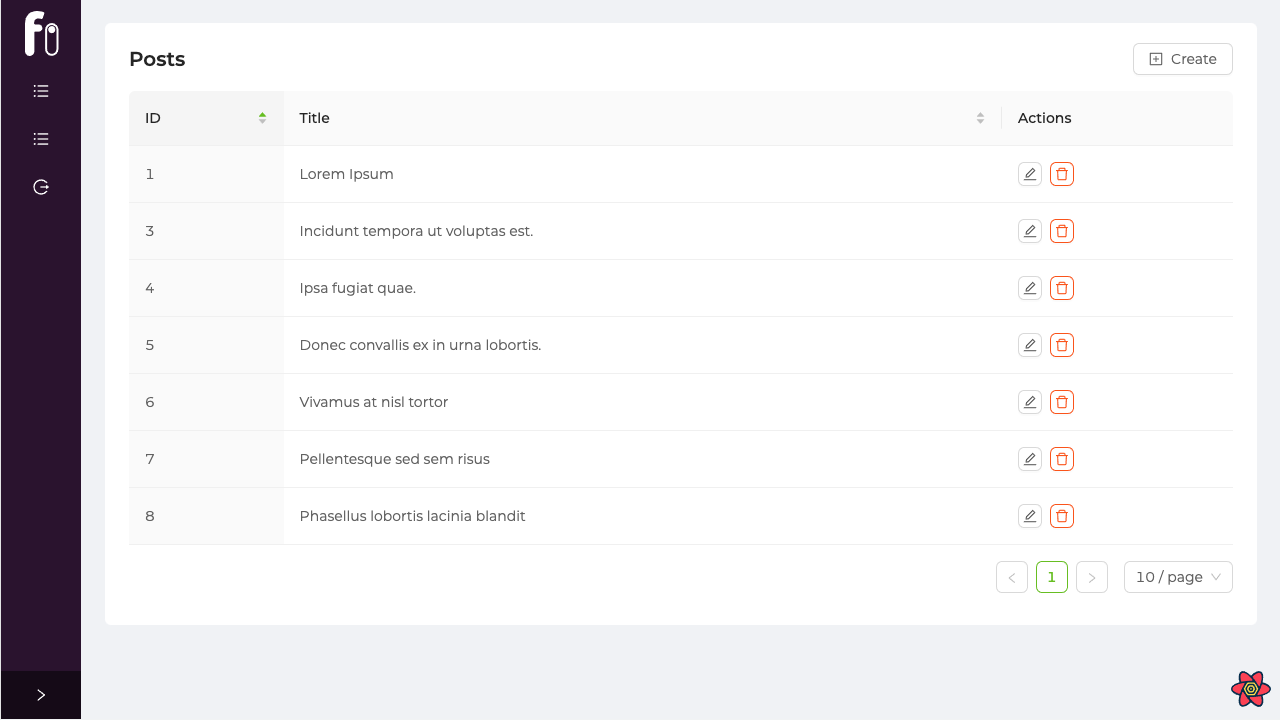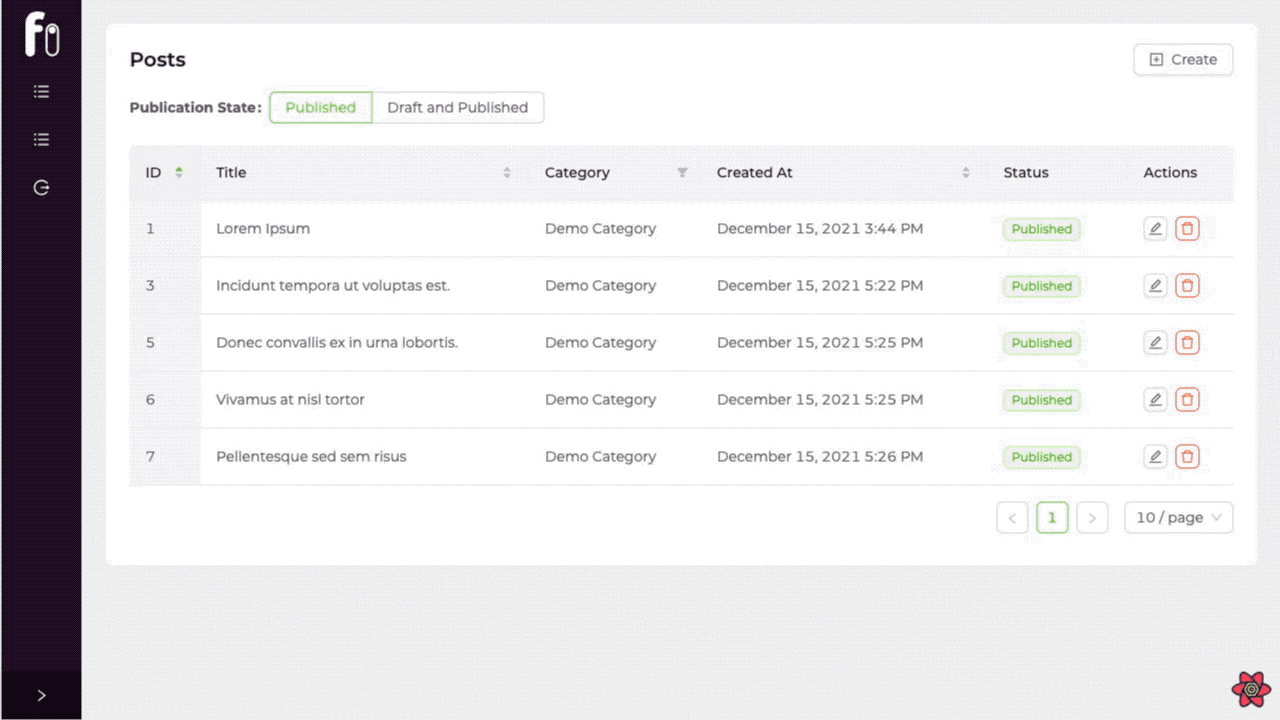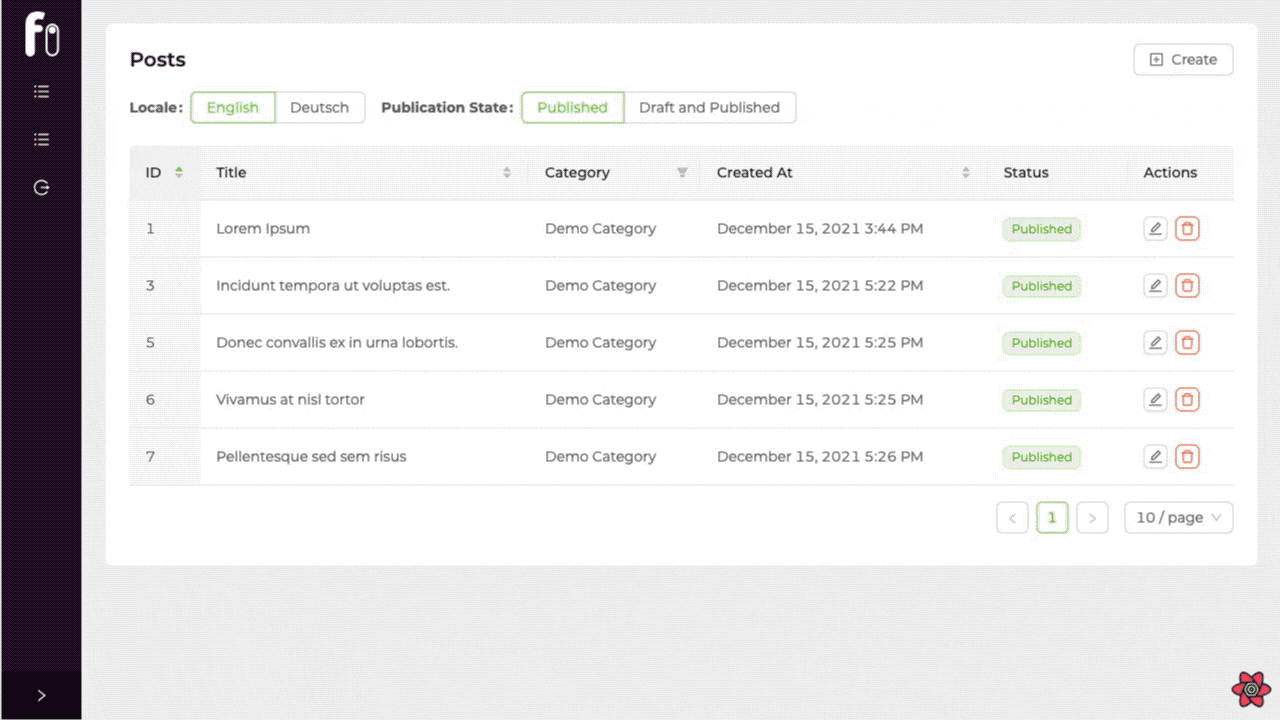Strapi-v4
refine supports the features that come with Strapi-v4.
A few of the Strapi-v4 API features are as follows:
- Fields Selection
- Relations Population
- Publication State
- Locale
meta allows us to use the above features in hooks. Thus, we can fetch the data according to the parameters we want.
Hooks and components that support meta:
There is no need to use meta for sorting, pagination, and, filters. Sorting, pagination, and, filters will be handled automatically by the strapi-v4 dataProvider.
Normally, strapi-v4 backend returns data in the following format:
{
"id": 1,
"attributes": {
"title": "My title",
"content": "Long content...",
}
However, we can use normalizeData to customize the data returned by the backend. So, our data will look like:
{
"id": 1,
"title": "My title",
"content": "Long content..."
}
Setup
npm i @refinedev/strapi-v4
To make this example more visual, we used the @refinedev/antd package. If you are using Refine headless, you need to provide the components, hooks, or helpers imported from the @refinedev/antd package.
Usage
import { Refine } from "@refinedev/core";
import { DataProvider } from "@refinedev/strapi-v4";
const App: React.FC = () => {
return (
<Refine
dataProvider={DataProvider("API_URL")}
/* ... */
>
{/* ... */}
</Refine>
);
};
API Parameters
Let's examine how API parameters that come with Strapi-v4 are used with meta. Then, let's see how it is used in the application.
Create Collections
We created two collections on Strapi as posts and categories and added a relation between them. For detailed information on how to create a collection, you can check here.
- posts
- categories
posts has the following fields:
idtitlecontentcategorycreatedAtlocale
categories has the following fields:
idtitle
Fields Selection
To select only some fields, we must specify these fields with `meta``.
Refer to the Fields Selection documentation for detailed information. →
const { tableProps } = useTable<IPost>({
meta: {
fields: ["id", "title"],
},
});
const { tableProps } = useTable<IPost>({
meta: {
fields: "*",
},
});
When sending the request, we can specify which fields will come, so we send fields in meta to hooks that we will fetch data from. In this way, you can perform the queries of only the fields you want.
import { useState } from "react";
import {
List,
useTable,
getDefaultSortOrder,
FilterDropdown,
useSelect,
EditButton,
DeleteButton,
} from "@refinedev/antd";
import { Table, Select, Space } from "antd";
import { IPost } from "interfaces";
import { API_URL } from "../../constants";
export const PostList: React.FC = () => {
const { tableProps, sorter } = useTable<IPost>({
meta: {
fields: ["id", "title"],
},
});
return (
<List>
<Table
{...tableProps}
rowKey="id"
pagination={{
...tableProps.pagination,
showSizeChanger: true,
}}
>
<Table.Column
dataIndex="id"
title="ID"
defaultSortOrder={getDefaultSortOrder("id", sorter)}
sorter={{ multiple: 3 }}
/>
<Table.Column
dataIndex="title"
title="Title"
defaultSortOrder={getDefaultSortOrder("title", sorter)}
sorter={{ multiple: 2 }}
/>
<Table.Column<{ id: string }>
title="Actions"
render={(_, record) => (
<Space>
<EditButton
hideText
size="small"
recordItemId={record.id}
/>
<DeleteButton
hideText
size="small"
recordItemId={record.id}
/>
</Space>
)}
/>
</Table>
</List>
);
};

Relations Population
By default, relations are not populated when fetching entries.
The populate parameter is used to define which fields will be populated.
Refer to the Relations Population documentation for detailed information. →
const { tableProps } = useTable<IPost>({
meta: {
populate: ["category", "cover"],
},
});
const { tableProps } = useTable<IPost>({
meta: {
populate: "*",
},
});
It should be noted that Strapi-V4 allows populating relations more than 1 level.
const { tableProps } = useTable<IPost>({
meta: {
populate: {
category: {
populate: ["cover"],
},
cover: {
populate: [""],
},
},
},
});
In order to pull the categories related to the posts, we can now show the categories in our list by defining the meta populate parameter.
import {
List,
useTable,
getDefaultSortOrder,
FilterDropdown,
useSelect,
EditButton,
DeleteButton,
} from "@refinedev/antd";
import { Table, Select, Space } from "antd";
import { IPost } from "interfaces";
import { API_URL } from "../../constants";
export const PostList: React.FC = () => {
const { tableProps, sorter } = useTable<IPost>({
meta: {
fields: ["id", "title"],
populate: ["category"],
},
});
const { selectProps } = useSelect({
resource: "categories",
optionLabel: "title",
optionValue: "id",
});
return (
<List>
<Table
{...tableProps}
rowKey="id"
pagination={{
...tableProps.pagination,
showSizeChanger: true,
}}
>
<Table.Column
dataIndex="id"
title="ID"
defaultSortOrder={getDefaultSortOrder("id", sorter)}
sorter={{ multiple: 3 }}
/>
<Table.Column
dataIndex="title"
title="Title"
defaultSortOrder={getDefaultSortOrder("title", sorter)}
sorter={{ multiple: 2 }}
/>
<Table.Column
dataIndex={["category", "title"]}
title="Category"
filterDropdown={(props) => (
<FilterDropdown {...props}>
<Select
style={{ minWidth: 200 }}
mode="multiple"
placeholder="Select Category"
{...selectProps}
/>
</FilterDropdown>
)}
/>
<Table.Column<{ id: string }>
title="Actions"
render={(_, record) => (
<Space>
<EditButton
hideText
size="small"
recordItemId={record.id}
/>
<DeleteButton
hideText
size="small"
recordItemId={record.id}
/>
</Space>
)}
/>
</Table>
</List>
);
};

Relations Population for /me request
If you need to the population for the /me request you can use it like this in your authProvider.
const strapiAuthHelper = AuthHelper(API_URL + "/api");
strapiAuthHelper.me("token", {
meta: {
populate: ["role"],
},
});
Publication State
The Draft & Publish feature should be enabled on Strapi.
Refer to the Publication State documentation for detailed information. →
live: returns only published entries
preview: returns draft and published entries
const { tableProps } = useTable<IPost>({
meta: {
publicationState: "preview",
},
});
We can list the posts separately according to the published or draft information.
import { useState } from "react";
import {
List,
useTable,
getDefaultSortOrder,
FilterDropdown,
useSelect,
DateField,
EditButton,
DeleteButton,
} from "@refinedev/antd";
import {
Table,
Select,
Space,
Form,
Radio,
Tag,
} from "antd";
import { IPost } from "interfaces";
import { API_URL } from "../../constants";
export const PostList: React.FC = () => {
const [publicationState, setPublicationState] = useState("live");
const { tableProps, sorter } = useTable<IPost>({
meta: {
fields: ["id", "title"],
populate: ["category"],
publicationState,
},
});
const { selectProps } = useSelect({
resource: "categories",
optionLabel: "title",
optionValue: "id",
});
return (
<List>
<Form
layout="inline"
initialValues={{
publicationState,
}}
>
<Form.Item label="Publication State" name="publicationState">
<Radio.Group
onChange={(e) => setPublicationState(e.target.value)}
>
<Radio.Button value="live">Published</Radio.Button>
<Radio.Button value="preview">
Draft and Published
</Radio.Button>
</Radio.Group>
</Form.Item>
</Form>
<br />
<Table
{...tableProps}
rowKey="id"
pagination={{
...tableProps.pagination,
showSizeChanger: true,
}}
>
<Table.Column
dataIndex="id"
title="ID"
defaultSortOrder={getDefaultSortOrder("id", sorter)}
sorter={{ multiple: 3 }}
/>
<Table.Column
dataIndex="title"
title="Title"
defaultSortOrder={getDefaultSortOrder("title", sorter)}
sorter={{ multiple: 2 }}
/>
<Table.Column
dataIndex={["category", "title"]}
title="Category"
filterDropdown={(props) => (
<FilterDropdown {...props}>
<Select
style={{ minWidth: 200 }}
mode="multiple"
placeholder="Select Category"
{...selectProps}
/>
</FilterDropdown>
)}
/>
<Table.Column
dataIndex="publishedAt"
title="Status"
render={(value) => {
return (
<Tag color={value ? "green" : "blue"}>
{value ? "Published" : "Draft"}
</Tag>
);
}}
/>
<Table.Column<{ id: string }>
title="Actions"
render={(_, record) => (
<Space>
<EditButton
hideText
size="small"
recordItemId={record.id}
/>
<DeleteButton
hideText
size="small"
recordItemId={record.id}
/>
</Space>
)}
/>
</Table>
</List>
);
};

Locale
To fetch content for a locale, make sure it has been already added to Strapi in the admin panel
Refer to the Locale documentation for detailed information. →
const { tableProps } = useTable<IPost>({
meta: {
locale: "de",
},
});
With the local parameter feature, we can fetch posts and categories created according to different languages.
import { useState } from "react";
import {
List,
useTable,
getDefaultSortOrder,
FilterDropdown,
useSelect,
EditButton,
DeleteButton,
} from "@refinedev/antd";
import { Table, Select, Space, Form, Radio, Tag } from "antd";
import { IPost } from "interfaces";
import { API_URL } from "../../constants";
export const PostList: React.FC = () => {
const [locale, setLocale] = useState("en");
const [publicationState, setPublicationState] = useState("live");
const { tableProps, sorter } = useTable<IPost>({
meta: {
populate: ["category", "cover"],
locale,
publicationState,
},
});
const { selectProps } = useSelect({
resource: "categories",
optionLabel: "title",
optionValue: "id",
meta: { locale },
});
return (
<List>
<Form
layout="inline"
initialValues={{
locale,
publicationState,
}}
>
<Form.Item label="Locale" name="locale">
<Radio.Group onChange={(e) => setLocale(e.target.value)}>
<Radio.Button value="en">English</Radio.Button>
<Radio.Button value="de">Deutsch</Radio.Button>
</Radio.Group>
</Form.Item>
<Form.Item label="Publication State" name="publicationState">
<Radio.Group
onChange={(e) => setPublicationState(e.target.value)}
>
<Radio.Button value="live">Published</Radio.Button>
<Radio.Button value="preview">
Draft and Published
</Radio.Button>
</Radio.Group>
</Form.Item>
</Form>
<br />
<Table
{...tableProps}
rowKey="id"
pagination={{
...tableProps.pagination,
showSizeChanger: true,
}}
>
<Table.Column
dataIndex="id"
title="ID"
defaultSortOrder={getDefaultSortOrder("id", sorter)}
sorter={{ multiple: 3 }}
/>
<Table.Column
dataIndex="title"
title="Title"
defaultSortOrder={getDefaultSortOrder("title", sorter)}
sorter={{ multiple: 2 }}
/>
<Table.Column
dataIndex={["category", "title"]}
title="Category"
filterDropdown={(props) => (
<FilterDropdown {...props}>
<Select
style={{ minWidth: 200 }}
mode="multiple"
placeholder="Select Category"
{...selectProps}
/>
</FilterDropdown>
)}
/>
<Table.Column
dataIndex="publishedAt"
title="Status"
render={(value) => {
return (
<Tag color={value ? "green" : "blue"}>
{value ? "Published" : "Draft"}
</Tag>
);
}}
/>
<Table.Column<{ id: string }>
title="Actions"
render={(_, record) => (
<Space>
<EditButton
hideText
size="small"
recordItemId={record.id}
/>
<DeleteButton
hideText
size="small"
recordItemId={record.id}
/>
</Space>
)}
/>
</Table>
</List>
);
};

meta Usages
When creating and editing posts you can use these API parameters in meta:
const { formProps, saveButtonProps, queryResult } = useForm<IPost>({
meta: { publicationState: "preview" },
});
const { formProps, saveButtonProps, queryResult } = useForm<IPost>({
meta: { populate: ["category", "cover"] },
});
const { selectProps } = useSelect({
meta: { locale: "en" },
});
File Upload
Strapi supports file upload. Below are examples of how to upload files to Strapi.
Refer to the Strapi documentation for more information →
- Ant Design Form
- React Hook Form
- Mantine Form
getValueProps and mediaUploadMapper are helper functions for Ant Design Form.
import { Edit, useForm } from "@refinedev/antd";
import { getValueProps, mediaUploadMapper } from "@refinedev/strapi-v4";
import { Form, Upload } from "antd";
import { TOKEN_KEY, API_URL } from "../../constants";
import { IPost } from "../interfaces";
export const PostEdit: React.FC = () => {
const { formProps, saveButtonProps } = useForm<IPost>({
metaData: { populate: ["cover"] },
});
return (
<Edit saveButtonProps={saveButtonProps}>
<Form
{...formProps}
layout="vertical"
onFinish={(values) => {
formProps.onFinish?.(mediaUploadMapper(values));
}}
>
<Form.Item label="Cover">
<Form.Item
name="cover"
valuePropName="fileList"
getValueProps={(data) => getValueProps(data, API_URL)}
noStyle
>
<Upload.Dragger
name="files"
action={`${API_URL}/api/upload`}
headers={{
Authorization: `Bearer ${localStorage.getItem(
TOKEN_KEY,
)}`,
}}
listType="picture"
multiple
>
<p className="ant-upload-text">
Drag & drop a file in this area
</p>
</Upload.Dragger>
</Form.Item>
</Form.Item>
</Form>
</Edit>
);
};
import { useState } from "react";
import axios from "axios";
import { Edit } from "@refinedev/mui";
import { Box, Input, Stack, Typography } from "@mui/material";
import { LoadingButton } from "@mui/lab";
import { HttpError } from "@refinedev/core";
import { useForm } from "@refinedev/react-hook-form";
import FileUploadIcon from "@mui/icons-material/FileUpload";
import { ICategory, IPost } from "interfaces";
import { TOKEN_KEY, API_URL } from "../../constants";
export const PostEdit: React.FC = () => {
const [isUploadLoading, setIsUploadLoading] = useState(false);
const [imageURL, setImageURL] = useState("");
const {
saveButtonProps,
register,
formState: { errors },
setValue,
setError,
} = useForm<
IPost,
HttpError,
IPost & { category: ICategory; cover: any }
>();
const onChangeHandler = async (
event: React.ChangeEvent<HTMLInputElement>,
) => {
try {
setIsUploadLoading(true);
const formData = new FormData();
const target = event.target;
const file: File = (target.files as FileList)[0];
formData.append("files", file);
const res = await axios.post(`${API_URL}/api/upload`, formData, {
headers: {
Authorization: `Bearer ${localStorage.getItem(TOKEN_KEY)}`,
},
});
setImageURL(`${API_URL}${res.data[0].url}`);
setValue("cover", res.data[0].id, { shouldValidate: true });
setIsUploadLoading(false);
} catch (error) {
setError("cover", { message: "Upload failed. Please try again." });
setIsUploadLoading(false);
}
};
return (
<Edit saveButtonProps={saveButtonProps}>
<Box
component="form"
sx={{ display: "flex", flexDirection: "column" }}
autoComplete="off"
>
<Stack
direction="row"
gap={4}
flexWrap="wrap"
sx={{ marginTop: "16px" }}
>
<label htmlFor="images-input">
<Input
id="images-input"
type="file"
sx={{ display: "none" }}
onChange={onChangeHandler}
/>
<input
id="file"
{...register("cover", {
required: "This field is required",
})}
type="hidden"
/>
<LoadingButton
loading={isUploadLoading}
loadingPosition="end"
endIcon={<FileUploadIcon />}
variant="contained"
component="span"
>
Upload
</LoadingButton>
<br />
{errors.cover && (
<Typography variant="caption" color="#fa541c">
{errors.cover?.message?.toString()}
</Typography>
)}
</label>
{imageURL && (
<Box
component="img"
sx={{
maxWidth: 250,
maxHeight: 250,
}}
src={imageURL}
alt="Post image"
/>
)}
</Stack>
</Box>
</Edit>
);
};
import { useState } from "react";
import axios from "axios";
import { Edit, useForm } from "@refinedev/mantine";
import { Text } from "@mantine/core";
import { Dropzone, IMAGE_MIME_TYPE, FileWithPath } from "@mantine/dropzone";
const API_URL = "http://localhost:1337";
const TOKEN_KEY = "strapi-jwt-token";
export const PostEdit: React.FC = () => {
const [isUploadLoading, setIsUploadLoading] = useState(false);
const { saveButtonProps, setFieldValue } = useForm<any>({
initialValues: {
title: "",
cover: "",
},
});
const handleOnDrop = async (files: FileWithPath[]) => {
try {
setIsUploadLoading(true);
const formData = new FormData();
const file = files[0];
formData.append("files", file);
const res = await axios.post(`${API_URL}/api/upload`, formData, {
headers: {
Authorization: `Bearer ${localStorage.getItem(TOKEN_KEY)}`,
},
});
setFieldValue("cover", res.data[0].id);
setIsUploadLoading(false);
} catch (error) {
setIsUploadLoading(false);
}
};
return (
<Edit saveButtonProps={saveButtonProps}>
<form>
<Text mt={8} weight={500} size="sm" color="#212529">
Cover
</Text>
<Dropzone
accept={IMAGE_MIME_TYPE}
onDrop={handleOnDrop}
loading={isUploadLoading}
>
<Text align="center">Drop images here</Text>
</Dropzone>
</form>
</Edit>
);
};
Server-side form validation
Strapi provides a way to add validation rules to your models. So if you send a request to the server with invalid data, Strapi will return errors for each field that has a validation error.
Refer to the Strapi documentation for more information →
By default, @refinedev/strapi-v4 transforms the error response from Strapi into a HttpError object. This object contains the following properties:
statusCode- The status code of the response.message- The error message.errors- An object containing the validation errors for each field.
Thus, useForm will automatically set the error message for each field that has a validation error.
Refer to the server-side form validation documentation for more information → .
Example
Username: demo@refine.dev
Password: demodemo
npm create refine-app@latest -- --example data-provider-strapi-v4